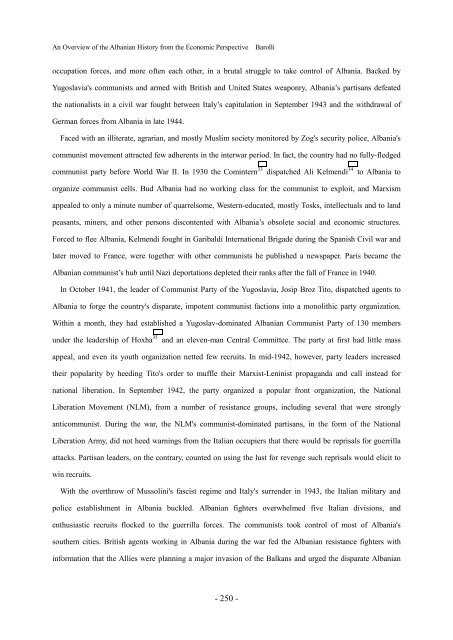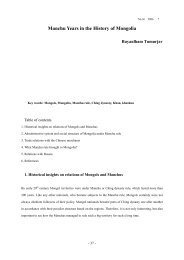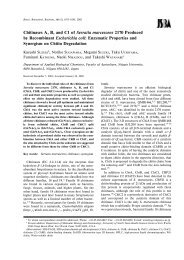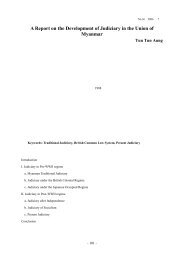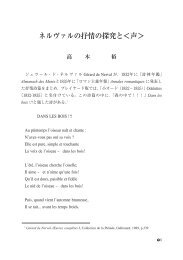An Overview of the Albanian History:
An Overview of the Albanian History:
An Overview of the Albanian History:
Create successful ePaper yourself
Turn your PDF publications into a flip-book with our unique Google optimized e-Paper software.
<strong>An</strong> <strong>Overview</strong> <strong>of</strong> <strong>the</strong> <strong>Albanian</strong> <strong>History</strong> from <strong>the</strong> Economic PerspectiveBarolli<br />
occupation forces, and more <strong>of</strong>ten each o<strong>the</strong>r, in a brutal struggle to take control <strong>of</strong> Albania. Backed by<br />
Yugoslavia's communists and armed with British and United States weaponry, Albania’s partisans defeated<br />
<strong>the</strong> nationalists in a civil war fought between Italy’s capitulation in September 1943 and <strong>the</strong> withdrawal <strong>of</strong><br />
German forces from Albania in late 1944.<br />
Faced with an illiterate, agrarian, and mostly Muslim society monitored by Zog's security police, Albania's<br />
communist movement attracted few adherents in <strong>the</strong> interwar period. In fact, <strong>the</strong> country had no fully-fledged<br />
communist party before World War II. In 1930 <strong>the</strong> Comintern 33 dispatched Ali Kelmendi 34<br />
to Albania to<br />
organize communist cells. Bud Albania had no working class for <strong>the</strong> communist to exploit, and Marxism<br />
appealed to only a minute number <strong>of</strong> quarrelsome, Western-educated, mostly Tosks, intellectuals and to land<br />
peasants, miners, and o<strong>the</strong>r persons discontented with Albania’s obsolete social and economic structures.<br />
Forced to flee Albania, Kelmendi fought in Garibaldi International Brigade during <strong>the</strong> Spanish Civil war and<br />
later moved to France, were toge<strong>the</strong>r with o<strong>the</strong>r communists he published a newspaper. Paris became <strong>the</strong><br />
<strong>Albanian</strong> communist’s hub until Nazi deportations depleted <strong>the</strong>ir ranks after <strong>the</strong> fall <strong>of</strong> France in 1940.<br />
In October 1941, <strong>the</strong> leader <strong>of</strong> Communist Party <strong>of</strong> <strong>the</strong> Yugoslavia, Josip Broz Tito, dispatched agents to<br />
Albania to forge <strong>the</strong> country's disparate, impotent communist factions into a monolithic party organization.<br />
Within a month, <strong>the</strong>y had established a Yugoslav-dominated <strong>Albanian</strong> Communist Party <strong>of</strong> 130 members<br />
under <strong>the</strong> leadership <strong>of</strong> Hoxha 35<br />
and an eleven-man Central Committee. The party at first had little mass<br />
appeal, and even its youth organization netted few recruits. In mid-1942, however, party leaders increased<br />
<strong>the</strong>ir popularity by heeding Tito's order to muffle <strong>the</strong>ir Marxist-Leninist propaganda and call instead for<br />
national liberation. In September 1942, <strong>the</strong> party organized a popular front organization, <strong>the</strong> National<br />
Liberation Movement (NLM), from a number <strong>of</strong> resistance groups, including several that were strongly<br />
anticommunist. During <strong>the</strong> war, <strong>the</strong> NLM's communist-dominated partisans, in <strong>the</strong> form <strong>of</strong> <strong>the</strong> National<br />
Liberation Army, did not heed warnings from <strong>the</strong> Italian occupiers that <strong>the</strong>re would be reprisals for guerrilla<br />
attacks. Partisan leaders, on <strong>the</strong> contrary, counted on using <strong>the</strong> lust for revenge such reprisals would elicit to<br />
win recruits.<br />
With <strong>the</strong> overthrow <strong>of</strong> Mussolini's fascist regime and Italy's surrender in 1943, <strong>the</strong> Italian military and<br />
police establishment in Albania buckled. <strong>Albanian</strong> fighters overwhelmed five Italian divisions, and<br />
enthusiastic recruits flocked to <strong>the</strong> guerrilla forces. The communists took control <strong>of</strong> most <strong>of</strong> Albania's<br />
sou<strong>the</strong>rn cities. British agents working in Albania during <strong>the</strong> war fed <strong>the</strong> <strong>Albanian</strong> resistance fighters with<br />
information that <strong>the</strong> Allies were planning a major invasion <strong>of</strong> <strong>the</strong> Balkans and urged <strong>the</strong> disparate <strong>Albanian</strong><br />
- 250 -


